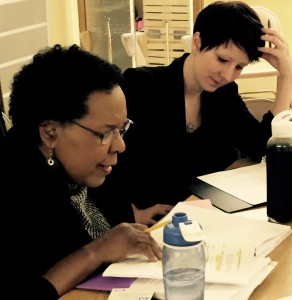(Photo of theatre designer and activist Edith Craig)
Much like today, the theatre scene throughout the 1900’s had politically passionate women at their helm. One of the earliest, most notable groups was the Actresses Franchise League: a British women’s suffrage organization. Founded in 1908, the Actresses Franchise League (AFL) was lead by American-born actress Gertrude Elliot, who served as president until the organization officially disbanded in 1934. Elliot and the rest of the female-lead AFL held community meetings, printed and distributed informational pamphlets, and produced propaganda plays.
One of the most popular plays produced was AFL member’s Cicely Hamilton’s How the Vote was Won. A satirical suffrage drama, How the Vote was Won tackled issues such as voting rights, gender roles, and economic responsibility. Much like other suffrage dramas, the play involved middle-class women promoting the suffrage movement, and was able to be performed with a minimal set and low budget. This allowed suffrage dramas to be produced by a wide variety of theater companies, and in turn reach a wide audience.
In advocating for the suffrage movement through theater, the AFL paved the way for many other woman-identifying artists seeking political change. For example, scenic designer and director Edith Craig formed the Pioneer Players in 1911, after being involved in the AFL. Similar to the AFL, the Pioneer Players produced suffrage dramas.
Craig believed these plays had a significant impact on the suffrage movement, saying, “ I do think plays have done such a lot for the Suffrage. They get hold of naive, frivolous people who would die sooner than go in cold blood to meetings. But they see the plays, and get interested, and then we can rope them in for meetings. All Suffrage writers ought to write Suffrage plays as hard as they can. It’s a great work,” (spartacus-educational.com).
One of the greatest accomplishments of the Pioneer Players was their production of In the Workhouse by Margaret Nevinson, which ultimately lead to the abolishment of a law that allowed husbands to maintain total control of their wives.
More politically-active women emerged in theater during the decades to come. In 1947, Judith Malina and her husband created The Living Theatre. Drawing from the styles of Bertolt Brecht and Anton Artaud, the theatre company is best known for producing plays about the Vietnam war in the 1960’s.
British playwright Caryl Churchill also incorporated elements of Brecht’s and Artaud’s styles into her work. Her long list of plays––written between the 1950’s and today––spans a wide range of political and social justice issues. For example, Top Girls, “deals with women’s losing their humanity in order to attain power in a male-dominated environment,” and examines Margaret Thatchers impact on British feminism, and Cloud Nine uses satire to explore sexual politics and imperialism (britannica.com).
More recently, documentary theater has also become a major home for politically-charged theater. For example, American playwright Emily Mann used court transcripts and interviews to investigate the American criminal justice system in Testimonies: Four plays, originally published in 1997.
British playwright and director Alecky Blythe also uses interviews to craft her works of “verbatim theater,” (the guardian.com). This style involves the actors speaking the text exactly as it was spoken in terms of words, pace, and tone by the interviewees. Blythe utilized this style in the 2008 play The Girlfriend Experience, which investigated brothels in Ipswich, England.
In advance of the 2016 US presidential elections, Theatre Unbound’s production of Lauren Gunderson’s The Taming explores the state of American democracy with provocative ideas and lots of laughs.
Sources:
https://www.britannica.com/biography/Caryl-Churchill
https://www.theguardian.com/stage/2011/apr/10/london-road-alecky-blythe-interview
http://blog.poortheatres.manchester.ac.uk/in-the-workhouse-theatrical-propaganda-from-1911/
http://spartacus-educational.com/WcraigE.htm
http://www.thesuffragettes.org/campaigning-performance/afl-pioneer-plays-key-individuals/





















